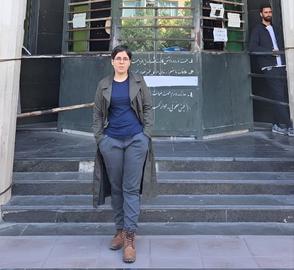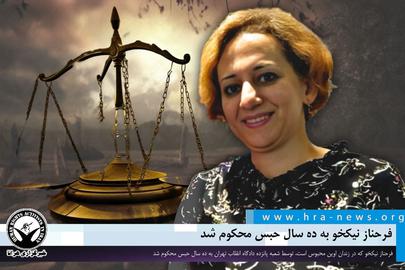Most people simply called her Pouri but the full name of the “mother of modern librarianship in Iran” was Pourandokht Soltani. She was also known as the “Lady of Love,” not only for her masterful translation of Erich Fromm’s famous book, The Art of Loving, into Persian, but also because she lived only three months with the love of her life and spent the rest of her life with memories of him and his tragic end.
She was born in the city of Hamedan in 1931. Her father, Mehdi Soltani Shirazi, a prominent constitutionalist lawyer, died while she was a child. She finished her primary and high school education in Shiraz and received her BA in Persian literature from the University of Tehran in 1952.
Pouri met Morteza Keyvan, a poet, literary critic and newspaper editor, at a wedding ceremony and they were married on June 17, 1954. However, only three months after their marriage, they were both arrested and charged with membership in the Communist Tudeh Party that had been declared illegal after the 1953 coup d'état that overthrew the democratically elected Prime Minister Mohammad Mosaddegh.
Morteza Keyvan was tried for treason for having harbored several members of the Tudeh Party’s Military Organization and was executed by firing squad at Tehran’s Qasr Prison, along with nine members of the organization.
Pouri was released from prison around five months after the execution of her husband. She had a nervous breakdown and was bed-ridden for two years due to illness. On the advice of her doctors, she then left for Britain in 1956.
She had left the Tudeh Party long before her marriage to Morteza Keyvan and had distanced herself from politics. “When I was in prison, I thought to myself that if I get out, I would stay away from politics because I considered it a waste of time for me,” she later said in an interview with the magazine Bukhara. “I came to the conclusion that I am not made for politics. I concluded that the problem lies in people’s ignorance and if I wanted to do something about the goals of the Tudeh Party — I mean the goals that we believed in, goals like freedom, welfare and justice, not what it turned out to be — I could not do it through politics. We must achieve these goals by enlightening people. Therefore, I had to become a teacher or go into cultural and artistic fields.”
In Britain, she began to study Aramaic languages and hoped that, after finishing her studies, she would return to Iran and teach these languages but, for various reasons, she changed her field of study to English literature.
In 1962, after receiving her degree from the University of Cambridge, Pouri returned to Iran. At first, Savak, the Shah’s secret police, prevented her from working. Then she started teaching night classes. It was during these years that she translated The Art of Loving.
In 1964, she met by accident her old friend Mehrdad Bahar, a prominent historian, linguist and mythologist. Bahar encouraged her to take the employment test for a position at the library of the Central Bank, and that is how she entered the world of librarianship. Pouri received her first lessons in librarianship from Ms. Goharian, the head of the library who graduated in library science in the US.
In 1966, Pouri participated in the entrance exam to study library science at Tehran University. In 1969, she was one of the first 13 graduates who received a master’s degree in this field. The same year, she was invited to teach cataloging and classification at the university. She also became a faculty member at Tehran University and a professor of library science at the National Library.
Pouri Soltani played a crucial role in setting up the Center for Scientific Papers and the Center for Library Services at the Ministry of Education and Sciences. These two centers were opened in 1968 and played a crucial role in modernizing Iranian libraries, especially university and research libraries. Pouri did not accept the presidency of the Center for Library Services and, instead, agreed to manage its research center. In the process, she was transferred from the Central Bank to the Ministry of Education and Sciences.
As the director of the research center of the Center for Library Services, and with the help of young graduates of library science, she translated the most important international standards of librarianship and adapted them to the requirements of Iran.
In the early 1970s, the government of Iran decided to create a large national library, named Pahlavi National Library. To this end, an advisory council was formed and Pouri Soltani was one of its members, but the 1979 revolution put an end to this project.
In 2001, Pouri Soltani retired but continued to cooperate with the National Library until 2013, when she fainted behind her desk while working. She was taken to the hospital and, even though she partially recovered after two months, she remained ill for two years and died in late 2015.
visit the accountability section
In this section of Iran Wire, you can contact the officials and launch your campaign for various problems


























comments